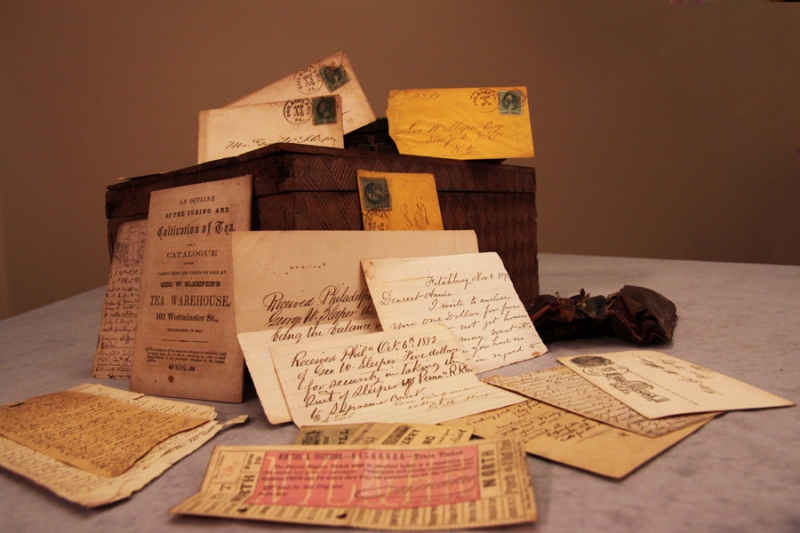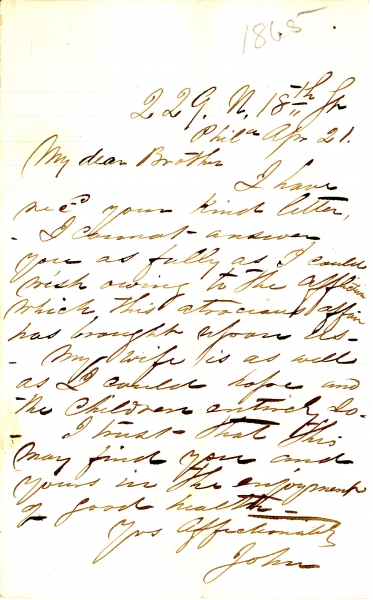Research Projects
The Sleeper Collection

In the fall of 1940, Asbury College received a donation of approximately 3,000 books and a large collection of science-related materials. The Oct. 26, 1940 issue of our student newspaper, The Collegian, estimated the donation to be worth $5,000 to $10,000. The article reads, “You have probably seen the pile of books and intriguing looking boxes in the reserve reading room and have wondered what in the world they could be. The tale that is connected, is both unusual and thrilling.”
Retired chemistry professor John Fremont Sleeper, elderly and in bad health, wrote several colleges expressing his wish to donate his chemistry equipment, 1,000 mineral specimens, 20,000 piece Conchology collection, lectures and personal library to the academic institution which best aligned with “certain stated conditions.” We do not know what those conditions were. However, we do know that President Z.T. Johnson replied immediately by telegram. Asbury was chosen out of all the other applicants, and several weeks later the collection arrived.
The Collegian article also states that “In addition to the collection, Professor Sleeper has willed to Asbury College, as a subsequent donation not in the original gift, the residue of his entire estate.” After Sleeper’s death, Asbury did receive the remains of his estate. Although his books were added to the library’s holdings, his personal papers remained in boxes until the Kinlaw Library was built in 2000 and all books and materials were moved from Morrison library.
In 2005, Archives began processing the Sleeper Family Papers. Staff then realized the significance of letters received in the shipment after Sleeper’s death. The letters, dating from the 1850’s to the early 1900’s, were written mostly by John Sleeper’s father, George Washington Sleeper, and included a certain notorious name—John Wilkes Booth.
George Washington Sleeper, a tea merchant, and his brother, struggling actor John Clarke, were born in Baltimore, Maryland, and grew up as neighbors with the ten Booth children. Their friendship continued into adulthood, and Clarke eventually married Asia Booth.
Letters between George Sleeper and John Clarke most often had to do with their monetary relationship. However, when John Wilkes Booth assassinated Lincoln, the Booth family’s calamity is personally expressed in Clarke’s letter:

[Letter from John Sleeper Clarke to his brother George]
My dear Brother
I have recd (received) your kind letter, I cannot answer you as fully as I could wish owing to the affliction which this atrocious affair has brought upon us – My wife is as well as I could hope and the children entirely so. I trust that this may find you and yours in the enjoyment of good health –
Yours affectionately
John
Persons desiring to view this letter and/or other letters in the Sleeper Family Papers should contact Archives. History major Ruth Slagle completed an independent study which involved researching the Sleeper family and transcribing the letters in the collection. Some of her notes can supply further information.
Ruth Slagle and Suzanne Gehring attended the Kentucky Library Association’s spring conference and made a presentation called “Bringing Hidden Treasures into the Light.” Their program included a display of the transcribed letters and more of the Sleeper family’s story. This collaboration between student and faculty is an example of how Archives hopes to develop more internship opportunities. Slagle’s goal was to share content from her research about the Sleeper Collection and Gehring’s goal was to convince librarians to encourage students to use Archives’ resources for hands-on, primary research.